This post may contain affiliate links. Please read our disclosure policy.
Over the last few years, Fairlife milk has become increasingly popular. You may be wondering: is Fairlife milk healthy?
Today’s dairy aisle isn’t just a simple choice between 2% and whole milk anymore.
With options expanding to include things like lactose-free milk, milk alternatives, milk with added omega-3s, and grass-fed varieties, health-conscious shoppers like you are faced with another interesting offering: ultra-filtered milk.
I’m Jamie, a Registered Dietitian Nutritionist here to help you nourish your body and your taste buds with the right foods, drinks, and treats for you.
In this article, I’ll explain what ultra-filtered milk is and give my two cents on if this is a better diet choice for you, or not.
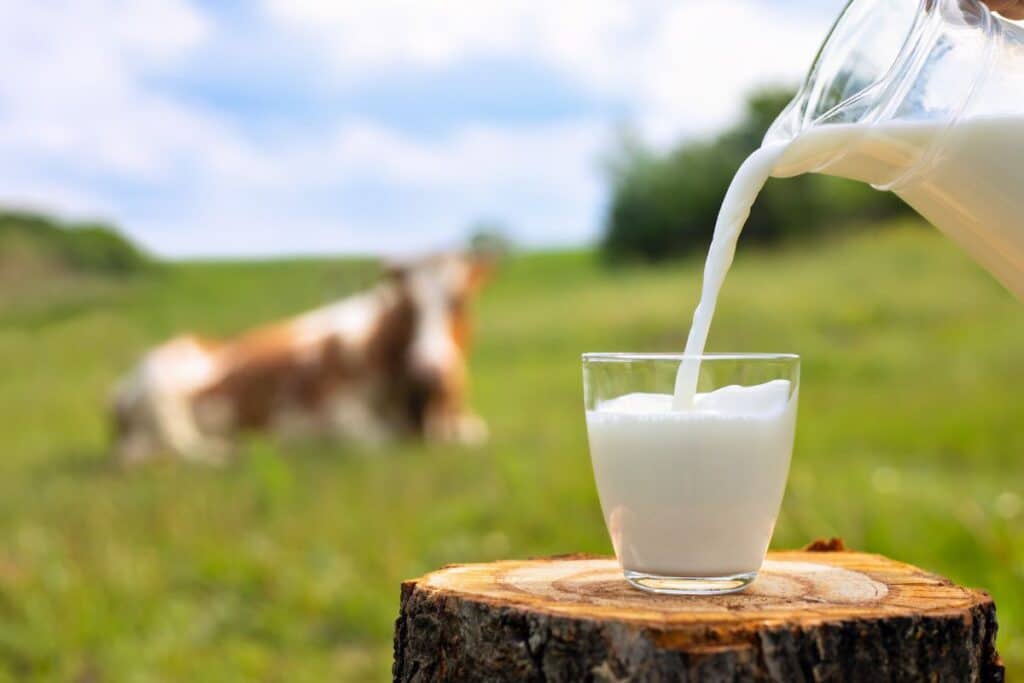
Understanding ultra-filtered milk
Before we jump into the nutritional showdown, it’s crucial to understand what ultra-filtered milk is all about.
Regular cow’s milk is made up of water, fat, protein, lactose (natural sugar in milk), vitamins, and minerals.
Ultra-filtered milk undergoes a filtration process that yields a higher protein milk with less sugar and even higher calcium content..
The protein content in ultra-filtered milk can be as high as 50% more than traditional milk, making it a pretty significant difference!
This makes it an attractive option for those seeking a protein boost without resorting to protein-heavy shakes or supplements.
Additionally, the removal of a considerable amount of lactose means fewer carbs, which may be beneficial for those watching their carbohydrate intake.
Its higher protein content and lower sugar is the nutrition combo that makes Fairlife popular as a “healthier” alternative to regular milk.
About Fairlife milk
Fairlife might just be the best-known brand of ultra-filtered milk and it has been around since 2012.
There are a few other brands of ultra-filtered milk, including Slate and Kroger’s brand of CarbMaster. The Kroger brand is different because it is both filtered (like Fairlife), they’ve also used lactase enzyme to naturally break down any remaining lactose, and it includes two artificial sweeteners.
Fairlife Milk is a well-recognized pioneer in the ultra-filtered milk industry. Their fat-free milk boasts a creamy taste and texture similar to 2%, and their 2% milk tastes more like whole milk, even though it contains 50% more protein and half the sugar of regular milk.
In addition to its claim of superior taste and texture, Fairlife promotes its extended shelf life, which is notable for anyone who feels frustrated with their milk going bad too quickly.
Fairlife Milk vs. Regular Milk
When it comes to the nutritional profile of Fairlife ultra-filtered milk compared to traditional milk, there are some similarities and some clear differences.
| Regular 2% Milk | Fairlife 2% milk | |
| Calories | 120 | 120 |
| Fat | 5g | 4.5g |
| Protein | 8g | 13g |
| Total sugar | 12g | 6g |
| Calcium | 250 mg | 380 mg |
| Vitamin D | 60 IU | 200 IU |
Ultra-filtered milk like Fairlife offer more protein, less sugar, and fewer carbs due to the lactose filtration. It’s also often enriched with vitamins to match or exceed the nutrition of traditional milk.
As a Registered Dietitian, I love a milk option like this because you get a bit more bang for your buck nutritionally.
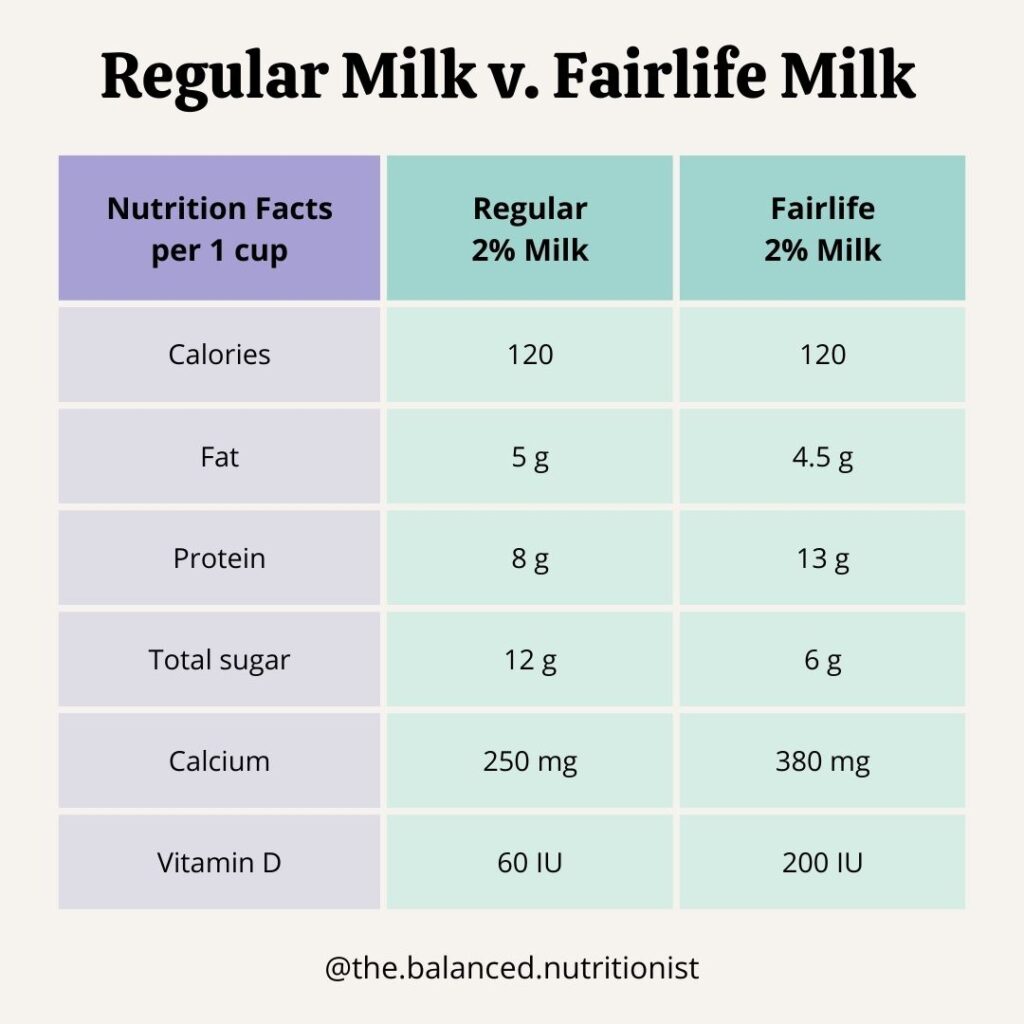
However, it’s important to note that while these differences may be beneficial to some people, traditional milk remains a highly nutritious choice. It still provides a great natural balance of nutrients for individuals.
Fairlife Flavored Milks
They even have a chocolate and strawberry 2% milk in the Fairlife products line (you’ll find the chocolate often in my fridge!).
Their chocolate milk has similar nutrition stats to their regular milk and only 6 grams of added sugar per cup of chocolate milk, which is impressively lower than most chocolate milk. It’s not uncommon for regular chocolate milk to have well over 10 grams of added sugar per cup.
Their 2% strawberry milk is lower sugar than most regular strawberry milk, too! I love both for adding to iced coffee for a protein boost.
Pros of Fairlife milk
Ultra-filtered milk, including Fairlife, can be a great addition to your diet depending on what you’re looking for. As a dietitian, here’s why I love it:
- Higher Protein: Protein is the nutrient that helps keep us most satisfied, so using this milk instead of regular milk gives you a few extra grams of protein without doing anything else! It’s also a great high protein option in general without having to rely on things like protein shakes.
- Lower carbohydrate: The lower sugar component of ultra-filtered milk makes it a great option for those who are looking to reduce their sugar intake or need to be mindful of carbohydrates, like individuals with diabetes.
- Creamier: Another cool thing about Fairlife is that the ultrafiltration produces an extra creamy milk. The fat-free milk tastes more like 2 percent milk, and the 2 percent tastes more like whole milk.
- Lactose-free: Because of the ultra-filtration process, Fairlife milk is lactose-free, making it a great option for those with lactose intolerance without sacrificing taste or nutritional value.
- Longer shelf life: The extended shelf life of Fairlife and similar products is a practical consideration, especially if you have a family that doesn’t fly through milk super quickly.
Ultra-filtered milk definitely has some pretty appealing health benefits, but as I said, regular milk is still a perfectly nutritious choice for your daily diet too.
If your current nutritional needs don’t require the specific benefits of this type of milk, the classic version might be more cost-effective and equally nutritious for your lifestyle.
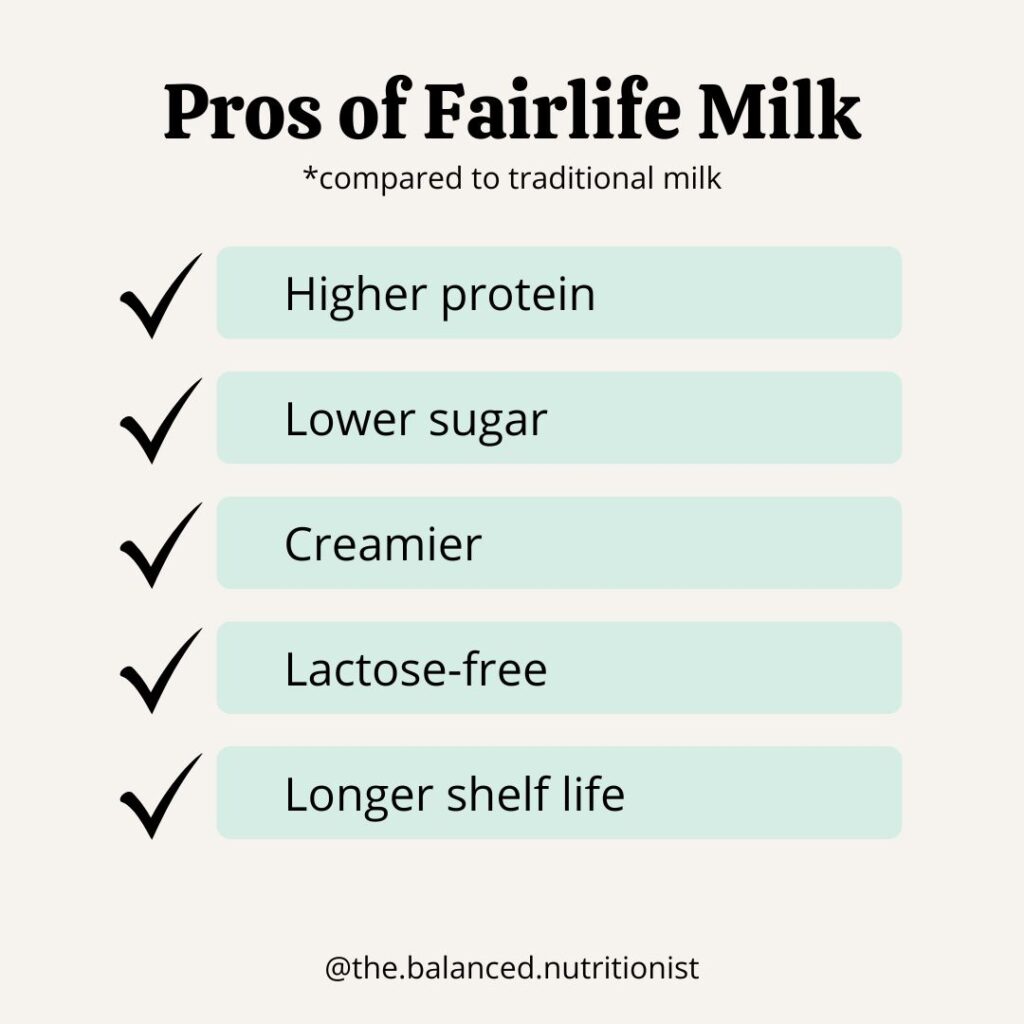
What about the cost?
When I checked the prices at my local grocery store, here is what I found.
- A 52-ounce bottle of 2% Fairlife milk costs $5.89 (~11 cents per oz.)
- A half-gallon of 2% store brand milk costs $3.39 (~5 cents per oz.)
(A half of a gallon has 64 ounces, so the bottle of Fairlife milk is a smidge smaller than a half-gallon).
Prices change all the time and vary based on location and grocery stores, of course. The prices near you might be different from what I found.
The bottom line is that Fairlife and most other ultra-filtered milks are pricier than regular milk.
But, they last longer. So, if you’re frequently pouring unused milk down the drain because of the expiration date, ultra-filtered milk may actually be more cost-effective.
The verdict on Fairlife milk
Is Fairlife milk better than regular milk? The answer hinges on the context of your nutritional needs and preferences.
Compared with other types of milk, the nutritional stats of Fairlife and other ultra-filtered milk products present a compelling case with their boosted protein and reduced sugar content.
Their great tasting products are an excellent option looking for a little bit of extra nutrition in their milk.
If you’re having no trouble meeting your protein needs and you’re not super concerned about carbohydrates, standard milk is absolutely fine too.
Your decision should be informed by your own personal health requirements, taste preferences, and budget. If you can’t justify the price increase, it’s no big deal.
In the end, whether you opt for a carton of Fairlife ultra-filtered milk or its counterpart, both can be part of a wholesome diet when consumed in moderation and as part of a balanced diet.
More product reviews
Was this fun to walk down the virtual grocery aisle with me? Let’s keep the party going with more product reviews so that you can be an informed and empowered shopper.
- Fairlife vs Premier Protein: Which Shakes are Best? (If you’re interested in the Fairlife Protein Shakes, don’t miss this one!)
- Collagen vs. Protein Powder: Which is Best for You?
- 25 Best High Fiber Cereal Foods from a Dietitian
- 15 Best High Fiber Bread Choices from a Dietitian
- Olipop vs. Poppi – A Dietitian’s Prebiotic Soda Review
High protein recipes
If you’re interested in Fairlife milk, you’re probably interested in other high protein stuff, too! Here are some of my favorite protein-boosted recipes to add to your weekly rotation.



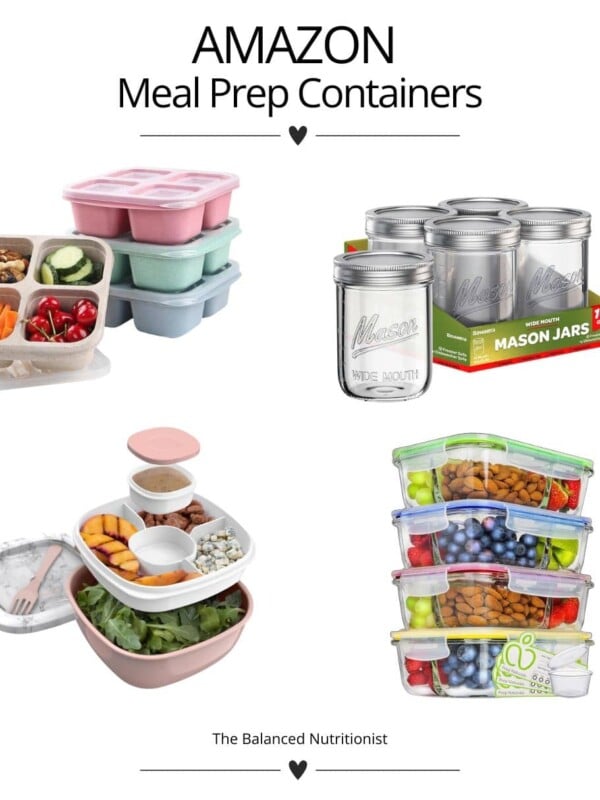
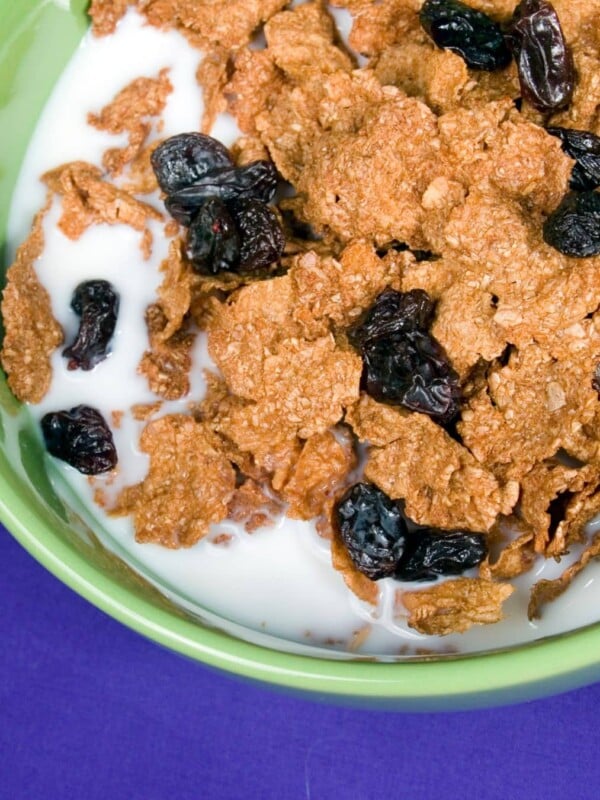









I drink fair life two years ago and everybody was bashing on it. My body always loved it especially post to work out. I always knew it was good somehow but all the reviews were not. All the reviews were anti-cows milk anti-fair life and pro almond rice etc. I could never tolerate almond milk and I knew it wasn’t right either. Thank you so much for this review
I’ve benn buying Fairlife low fat milk because it has less sugar and I’m a borderline diabetic. I love the taste and I don’t mind paying the additional price because I use it in my coffee all day. I also buy the Fairlife chocolate milk for my husband because he’s usually lactose intolerant and this milk never bothers his stomach.
I make Greek yogurt with Fairlife 3.25% milk in my Instant Pot. Super easy, high protein, and doesn’t need any further filtering to make Greek yogurt. Plus it’s about half the cost of commercial Greek yogurt.
Wow…I would love your recipe!! What is an instapot?
We have just tried Fairlife for the first time. My husband loves it as he is lactose intolerant. I liked it until I had the after taste of artificial sweeteners that are in it. I feel there should have been something on the packaging stating this. And, I hope the cruelty to the cows has been resolved.
There are no artificial sweeteners in their milks- just their protein shakes 🙂
A few years ago, a nutritionist suggested that I drink Fairlife chocolate milk instead of protein shakes. At the time, I was very low on protein, because I had stopped eating meat and was not getting in enough protein. I am noticing tremendous improvement in my health. My thyroid is function back to normal now and other health issues have improved tremendously. I contribute must to all the vitamins, selenium, etc. that is found in the Fairlife milk. I buy sometimes 7 52 ounces (2 regular fat free/5 chocolate) at a time. I only drink regular water, seltzer water, and the milk. My question is, is it ok to drink about 2 cups (16 ounces per day)?
I’d always run specific questions by your doctor or dietitian!
The protein shakes all seem to contain carrageenan. I thought we were supposed to avoid this. What’s the verdict on that?
Although I agree that it’s nice to have a quick option to get a lot of protein. I’m a little surprised that this article so blatantly glazed over the fake sugars. These products contain two different fake sugars, three if you count Stevia rather than standard sugar. I think one argument against this product is that it is an ultra processed product. The other argument is that there are significant artificial sweeteners found within it, which have clearly been shown to be unhealthy. Although you do mention in one little line that those artificial sweeteners exist, I feel as though it is probably a strongest argument against this product, I feel it warrant its own paragraph in the con section rather than two lines in the bulk of the body of the article that I only caught the second time reading the article. I’m surprised that this was not discussed. It is actually the only reason I don’t drink this product.
Where in the above article does it say that Fairlife has artificial sweeteners added?
Fairlife milk, just regular milk, whole, 2% or Fat Free does not contain artificial sweeteners, only the flavored ones.
where does the calcium come from ? a lot of milk has calcium carbinate in it which is the same as black board chalk